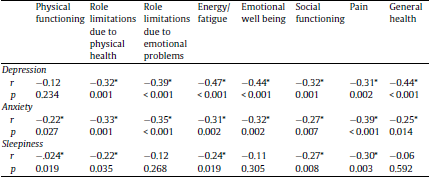Table 1 The correlation between depression, anxiety and sleepiness scores with the subscores of the quality of life scale in 112 emergency medical staff.

Published online by Cambridge University Press: 23 March 2020
One hundred and twelve emergency medical staff are faced with many physical and mental problems due to the deterioration of their sleep-wake cycle and getting out of their usual work and social life.
The aim of this study was to examine the effects of anxiety, depression, day time sleepiness on the quality of life in 112 emergency medical staff.
Target population of this cross-sectional study was the 112 emergency medical staff in the province of Rize. We tried to obtain all the universe (n = 154), so the sample was not selected. One hundred and four people (67%) participated in the study. In the data form, Epworth sleepiness scale, Beck Anxiety Inventory, Beck Depression Inventory and the SF-36 quality of life questionnaire were applied.
The prevalence of pathological sleepiness was 14.4% (n = 15), the prevalence of anxiety was 39,8% (n = 41), the prevalence depression was 20,2% (n = 21), respectively (Table 1).
Based on high levels of anxiety and depression that reduces quality of life compared to the general population in 112 emergency services workers, motivational programs, coping strategies, psychological counseling services are required. Also, against the psychosocial risk factors forming anxiety and depression in the working life, organizational measures must be taken.
The authors have not supplied their declaration of competing interest.
Table 1 The correlation between depression, anxiety and sleepiness scores with the subscores of the quality of life scale in 112 emergency medical staff.


Table 1 The correlation between depression, anxiety and sleepiness scores with the subscores of the quality of life scale in 112 emergency medical staff.
Comments
No Comments have been published for this article.